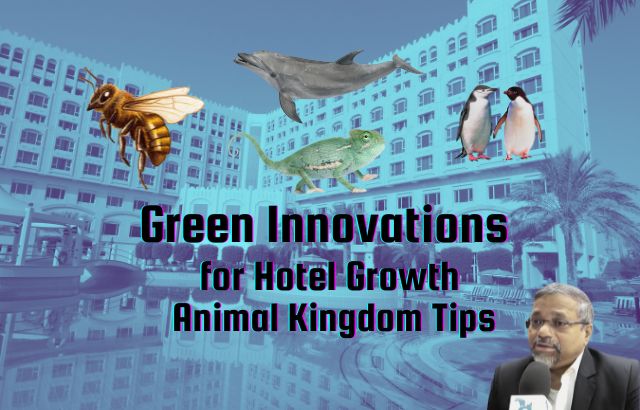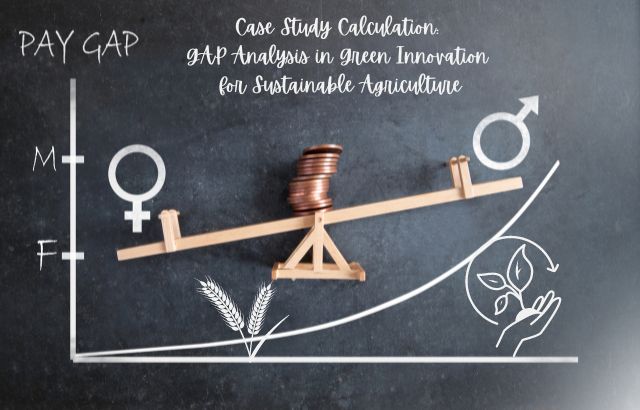In today’s world, where sustainability is more than just a buzzword, integrating green innovations into your hotel business isn’t just good for the environment—it’s good for business. Whether you’re managing a quaint village inn or a bustling urban hotel, adopting eco-friendly practices can set you apart and attract a growing demographic of environmentally-conscious travelers. To illustrate how these green innovations can make a big impact, let’s draw some inspiration from the animal kingdom.\
Insights from Jaiguru:
Jaiguru emphasizes that integrating nature-inspired innovations into hotel operations not only supports environmental sustainability but also drives financial growth. By mimicking natural efficiencies and processes, hotels can optimize resource use, enhance guest experiences, and achieve significant cost savings.
Green Innovations for Hotel Growth: Animal Kingdom Tips

1. The Bee’s Efficiency: Optimizing Resource Use
Bees are the ultimate role models for efficiency. They work collectively to make the most out of their resources, whether it’s nectar or pollen. Similarly, hotels can optimize resource use to reduce waste and lower costs.
Innovation Tip: Implementing energy-efficient systems such as LED lighting and smart thermostats can drastically cut down on electricity use. For instance, smart thermostats adjust temperatures based on room occupancy, just like bees efficiently manage their hive’s resources. Additionally, water-saving fixtures in showers and faucets reduce water waste, mirroring the bees’ efficient nectar collection.
2. The Chameleon’s Adaptability: Tailoring Sustainability Practices
Chameleons are renowned for their ability to adapt to their surroundings, changing their color to blend in seamlessly with their environment. Your hotel can adopt a similar approach by customizing green practices to fit your specific location and clientele.
Innovation Tip: For village hotels nestled in natural settings, consider incorporating local materials into your design and operations. Using reclaimed wood or locally-sourced stone not only supports the local economy but also minimizes transportation emissions. Urban hotels, on the other hand, can focus on initiatives like green roofs and vertical gardens, which provide insulation and help combat the heat island effect in densely built environments.
3. The Penguin’s Teamwork: Encouraging Staff Involvement
Penguins are known for their teamwork, huddling together for warmth and protection. Likewise, engaging your staff in sustainability efforts is crucial for the success of your green initiatives.
Innovation Tip: Create a ‘green team’ within your hotel to champion eco-friendly practices. Just as penguins work together to achieve a common goal, your team can collaborate on projects like waste reduction programs or sustainability training for new hires. Regularly updating staff on the hotel’s environmental goals and successes can foster a sense of ownership and motivate them to contribute more actively.
4. The Spider’s Web: Building Sustainable Networks
Spiders weave intricate webs that are both functional and resilient. This concept of creating a strong, interconnected system can be applied to building sustainable networks within your hotel operations.
Innovation Tip: Develop partnerships with local businesses to create a sustainable supply chain. For example, source organic or fair-trade products from local vendors and collaborate with nearby restaurants to offer eco-friendly dining options for your guests. Like a spider’s web, these connections can enhance the overall sustainability of your hotel and provide a unique selling point for eco-conscious travelers.
5. The Owl’s Night Vision: Embracing Technology
Owls are masters of night vision, utilizing advanced sensory abilities to navigate and hunt in the dark. In a similar vein, hotels can leverage modern technology to enhance their green efforts.
Innovation Tip: Invest in advanced energy management systems and real-time monitoring tools. These technologies allow you to track and optimize energy use, detect inefficiencies, and make data-driven decisions to reduce your carbon footprint. Additionally, digital check-in and keyless entry systems can minimize paper waste and enhance the guest experience.
6. The Ant’s Organization: Streamlining Waste Management
Ants are incredibly organized creatures, creating efficient systems for waste management and resource allocation. Your hotel can emulate this by streamlining waste management processes.
Innovation Tip: Implement a comprehensive recycling and composting program, similar to how ants meticulously manage waste in their colonies. Clearly labeled bins, staff training on waste segregation, and partnerships with local composting facilities can help reduce landfill waste and promote recycling. Additionally, consider using biodegradable or reusable amenities to further cut down on single-use plastics.
7. The Dolphin’s Intelligence: Educating and Engaging Guests
Dolphins are known for their intelligence and social behavior, often engaging in complex interactions. Hotels can draw from this by educating and engaging guests in their sustainability efforts.
Innovation Tip: Create informative and interactive experiences for guests to learn about your hotel’s green practices. Offer tours that showcase your sustainability initiatives, provide educational materials in guest rooms, and host events like eco-friendly cooking classes or nature walks. Just as dolphins share knowledge within their pods, sharing your green journey with guests can foster a sense of connection and encourage them to support sustainable practices.
Green innovations for hotel growth – FAQs Answered by Jaiguru Kadam

How can green innovations benefit hotel businesses?
Answer: Green innovations can reduce costs, enhance guest satisfaction, and attract eco-conscious travelers. They also contribute to sustainability and can improve your hotel’s reputation.
What animal kingdom lessons can be applied to hotels?
Answer: Lessons from the animal kingdom, like resource efficiency seen in bees or waste management in elephants, can inspire sustainable practices such as energy conservation and waste reduction in hotels.
Green innovations for hotel growth – How can hotels implement eco-friendly strategies effectively?
Answer: Hotels can implement eco-friendly strategies by adopting energy-efficient technologies, reducing waste, using sustainable materials, and engaging in green certifications. Regularly reviewing and updating these practices ensures ongoing improvement.
Green innovations for hotel growth – Why is sustainability important for the hotel industry?
Answer: Sustainability is crucial for the hotel industry as it helps reduce environmental impact, meet growing consumer demand for eco-friendly options, and can lead to cost savings and increased profitability through efficient resource management.
Green innovations for hotel growth – What are some examples of successful green innovations in hotels?
Answer: Examples include solar energy systems, water-saving fixtures, zero-waste programs, and organic or locally-sourced amenities. These innovations not only reduce environmental impact but also enhance guest experience and can improve operational efficiency
Compelling Statistics and Insights from Jaiguru on Optimizing Resource Efficiency for a Greener Future

Here are some compelling statistics related to green innovations and sustainability in the hotel industry, with inspiration from nature:
- Energy Efficiency: Hotels implementing energy-efficient technologies, such as LED lighting and smart thermostats, can reduce energy consumption by up to 30%—similar to the energy-efficient hive management of honeybees.
- Water Conservation: Installing water-saving fixtures can cut water usage by 20-30%, paralleling how elephants efficiently manage water resources in their habitats.
- Waste Reduction: Hotels adopting zero-waste strategies can divert up to 90% of their waste from landfills, much like how ants recycle and repurpose materials within their colonies.
- Guest Preferences: 72% of travelers prefer eco-friendly accommodations, reflecting the increasing demand for green practices similar to how migratory animals choose habitats based on environmental conditions.
- Cost Savings: Green innovations can lead to significant cost savings, with hotels saving an average of $1.5 million annually through energy and water efficiency improvements, much like the cost-effective foraging strategies of birds.
- Carbon Footprint: Hotels that use renewable energy sources can reduce their carbon footprint by up to 50%, akin to how green sea turtles contribute to marine ecosystem health through their feeding habits.
- Market Growth: The sustainable travel market is growing at a rate of 10% annually, inspired by nature’s ability to adapt and thrive in changing environments.
Conclusion

Incorporating green innovations into your hotel business not only benefits the environment but also enhances guest satisfaction and operational efficiency. By drawing lessons from the animal kingdom, you can create a more sustainable and successful hotel. Whether it’s the efficiency of bees, the adaptability of chameleons, or the teamwork of penguins, these natural strategies can guide you in building a greener future for your hotel. Embrace these lessons, and watch your hotel business thrive in harmony with the environment.












